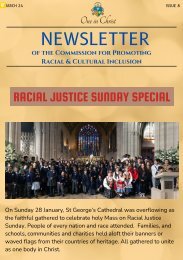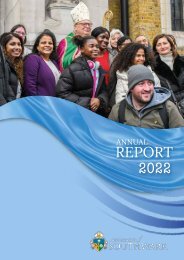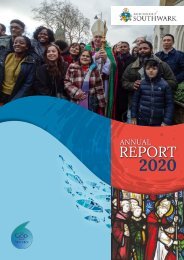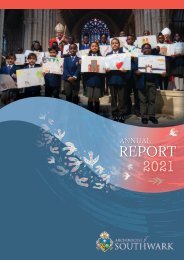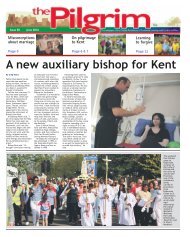Issue 06 - The Pilgrim - June 2012 - The newspaper of the Archdiocese of Southwark
The June 2012 issue of "The Pilgrim", the newspaper of the Archdiocese of Southwark
The June 2012 issue of "The Pilgrim", the newspaper of the Archdiocese of Southwark
- No tags were found...
Create successful ePaper yourself
Turn your PDF publications into a flip-book with our unique Google optimized e-Paper software.
Features <strong>The</strong> <strong>Pilgrim</strong> <strong>June</strong> <strong>2012</strong><br />
Bookcase<br />
My favourite book<br />
Emma Geiringer, a student at <strong>the</strong> Holy Cross<br />
and Richard Challoner Federated Sixth Form,<br />
New Malden, says William Golding’s <strong>The</strong> Lord<br />
<strong>of</strong> <strong>the</strong> Flies is a book that gives you much to<br />
think about.<br />
<strong>The</strong> fictional tale <strong>of</strong> a group <strong>of</strong> British schoolboys<br />
stranded on a desolate island after <strong>the</strong>ir<br />
plane crashed is an unforgettable read.<br />
<strong>The</strong> exact reason for <strong>the</strong>m being on <strong>the</strong><br />
plane is not specified, but we can assume it<br />
was because <strong>the</strong>y were being evacuated from<br />
<strong>the</strong> unspecified nuclear war taking place.<br />
A hierarchy quickly develops after <strong>the</strong> boys<br />
appoint Ralf as <strong>the</strong>ir leader. But it isn’t long<br />
before <strong>the</strong>ir improvised, self-created society<br />
descends into chaos, ultimately resulting in <strong>the</strong><br />
death <strong>of</strong> three <strong>of</strong> <strong>the</strong> boys.<br />
As well as having a page-turning plot, <strong>the</strong>re<br />
are many parallels that can be drawn from <strong>the</strong><br />
<strong>the</strong>mes in <strong>the</strong> book. We see <strong>the</strong> natural savagery<br />
<strong>of</strong> humans and <strong>the</strong> destruction <strong>of</strong> democracy,<br />
represented by <strong>the</strong> smashing <strong>of</strong> <strong>the</strong> conch<br />
shell, which had been used to keep order and<br />
symbolise civilisation.<br />
I would definitely recommend this book to<br />
readers <strong>of</strong> any age, as it is not only entertaining<br />
but also thought provoking as <strong>the</strong> events<br />
and characters remain on your mind even after<br />
finishing <strong>the</strong> book.<br />
Film review<br />
.<br />
Ano<strong>the</strong>r Earth (12a)<br />
Directed by Mike Cahill<br />
Films and books can be<br />
more than entertainment<br />
<strong>The</strong> cast <strong>of</strong><br />
Downton Abbey<br />
By Martin Tapsell<br />
In Ano<strong>the</strong>r Earth promising teenage driver<br />
Rhoda (Brit Marland) crashes into and kills a<br />
pregnant wife and her son, leaving her<br />
husband John comatose.<br />
Rhoda serves four years in prison but <strong>the</strong>n,<br />
guilt stricken, traces John (William Mapo<strong>the</strong>r)<br />
through a crash shrine note and <strong>of</strong>fers to clean<br />
for him. An uneasy but cathartic relationship<br />
ensues with <strong>the</strong> initially unsuspecting John.<br />
When a planet identical to earth appears in<br />
<strong>the</strong> sky, contact is made. It seems to totally<br />
replicate Earth 1. It’s like a place where we<br />
might replay our hand and avoid tragic mistakes.<br />
So John and Rhoda aim to visit Earth 2,<br />
which may symbolise Heaven.<br />
<strong>The</strong> ending <strong>of</strong> <strong>the</strong> film is inconclusive, but it<br />
raises <strong>the</strong> question <strong>of</strong> a parallel universe, and<br />
by implication <strong>the</strong> free will mankind has to<br />
commit good or evil.<br />
Martin Tapsell is <strong>the</strong> author <strong>of</strong> Kent<br />
Cinemas Revisited<br />
Prayer book<br />
exhibition<br />
Monarchy and <strong>the</strong> Book <strong>of</strong> Common Prayer<br />
Ends 14 July <strong>2012</strong> Tuesday - Saturday<br />
& Bank Holiday Monday 4 <strong>June</strong>.<br />
Bishop Paul Hendricks<br />
Did you watch <strong>the</strong> TV series Downton<br />
Abbey last autumn My diary gets ra<strong>the</strong>r<br />
full, but I made a point <strong>of</strong> recording<br />
every episode, so I could watch it later.<br />
<strong>The</strong>re was such a lot to it, in terms <strong>of</strong><br />
<strong>the</strong> range <strong>of</strong> different characters and <strong>the</strong><br />
way <strong>the</strong>y relate to each o<strong>the</strong>r.<br />
For instance, a man is discovered dead<br />
in <strong>the</strong> bedroom <strong>of</strong> one <strong>of</strong> <strong>the</strong> unmarried<br />
daughters <strong>of</strong> <strong>the</strong> house. Those who happen<br />
to know have to decide what to do<br />
about it. And in this <strong>the</strong>y also reveal<br />
something <strong>of</strong> <strong>the</strong>ir own attitudes and personalities.<br />
But, more to <strong>the</strong> point, so do we. We<br />
find ourselves agreeing or disagreeing<br />
with this or that person, perhaps wishing<br />
<strong>the</strong>y’d acted differently, and wondering<br />
what we would have done in <strong>the</strong>ir position.<br />
Any good story does something like<br />
this. Whe<strong>the</strong>r we realise it or not, <strong>the</strong><br />
way we respond tells us something about<br />
ourselves.<br />
Many years ago, when I was still in my<br />
first parish, I went to see a film adaptation<br />
<strong>of</strong> Dickens’ book, Little Dorrit — and<br />
for <strong>the</strong> next few weeks you might say I<br />
was living a sort <strong>of</strong> double life.<br />
I was doing all <strong>the</strong> usual things a priest<br />
does, saying Mass, visiting <strong>the</strong> sick, daily<br />
prayer, and so on. But in between <strong>the</strong>se<br />
things, as you might say in <strong>the</strong> background<br />
<strong>of</strong> my mind, I was still thinking<br />
about all <strong>the</strong> characters in <strong>the</strong> film.<br />
I mulled over <strong>the</strong> choices <strong>the</strong>y’d made,<br />
wondering what would have happened if<br />
<strong>the</strong>y’d chosen differently.<br />
You won’t be surprised to hear that I<br />
went back to see <strong>the</strong> film again, and it<br />
wasn’t long before I’d read <strong>the</strong> book as<br />
well. This in turn gave me something to<br />
think about, comparing how <strong>the</strong> characters<br />
had acted in <strong>the</strong> book and film versions<br />
<strong>of</strong> <strong>the</strong> story.<br />
And again, just as important, what my<br />
own reactions told me about myself, even<br />
though I may not have been able to put it<br />
into words precisely.<br />
Is this anything pr<strong>of</strong>ound, or is it just<br />
entertainment Perhaps something in between.<br />
Consider Arthur, one <strong>of</strong> <strong>the</strong> main characters.<br />
He returns to England after<br />
twenty years in China, doing a job he<br />
hated, but obedient to his parents’<br />
wishes.<br />
He meets his childhood swee<strong>the</strong>art and<br />
is shocked to find that she is really silly<br />
and shallow. <strong>The</strong> idea he had <strong>of</strong> her was<br />
only a illusion.<br />
He falls in love with a beautiful young<br />
woman, but realises that she loves someone<br />
else. He puts his feelings on one side<br />
and does all he can to reconcile her fa<strong>the</strong>r<br />
to <strong>the</strong> marriage.<br />
On <strong>the</strong> wedding day, <strong>the</strong> bridegroom<br />
casually tells Arthur that he himself is “a<br />
disappointed man”, cynical about his<br />
work and evidently fairly casual even<br />
about his marriage.<br />
He expresses envy <strong>of</strong> Arthur, who has<br />
“clearly never been disappointed”.<br />
<strong>The</strong> shallowness <strong>of</strong> this comment,<br />
amounting almost to cruelty, brings home<br />
by contrast <strong>the</strong> strengths <strong>of</strong> Arthur’s character.<br />
He has suffered so much, been imposed<br />
on in different ways, had various disillusioning<br />
experiences — and yet remained<br />
steady in doing what is right, always<br />
looking for <strong>the</strong> best in people and in situations.<br />
This is just one <strong>of</strong> many examples, from<br />
that one book. Taken toge<strong>the</strong>r, <strong>the</strong>y gave<br />
me as much to reflect upon as anything<br />
I’d read for quite some time.<br />
<strong>The</strong>re are so many o<strong>the</strong>r books I could<br />
also mention. But perhaps you can get<br />
some idea why I believe that <strong>the</strong>re can<br />
certainly be a significant spiritual dimension<br />
to novels, films and o<strong>the</strong>r forms <strong>of</strong><br />
what we normally think <strong>of</strong> as “just<br />
entertainment”.<br />
This exhibition traces <strong>the</strong> close<br />
relationship between royalty and<br />
religion from medieval to modern<br />
times. It tells <strong>the</strong> story <strong>of</strong> <strong>the</strong><br />
Book <strong>of</strong> Common Prayer and its<br />
importance in national life.<br />
This story is illustrated with<br />
books, manuscripts and objects,<br />
many <strong>of</strong> which have royal or<br />
o<strong>the</strong>r important provenances.<br />
<strong>The</strong> centrepiece <strong>of</strong> <strong>the</strong> exhibition<br />
will be <strong>the</strong> 1662 revision <strong>of</strong><br />
<strong>the</strong> Book <strong>of</strong> Common Prayer.<br />
O<strong>the</strong>r highlights <strong>of</strong> <strong>the</strong> exhibition<br />
include:<br />
A 1549 printing <strong>of</strong> <strong>the</strong> Book <strong>of</strong><br />
Common Prayer<br />
Medieval illuminated manuscripts,<br />
including <strong>the</strong> Book <strong>of</strong><br />
Hours <strong>of</strong> Richard III Queen<br />
Elizabeth I's personal prayer<br />
book and a copy <strong>of</strong> <strong>the</strong> book <strong>of</strong><br />
private devotions compiled for<br />
Queen Elizabeth II in preparation<br />
for her coronation.<br />
<strong>The</strong> Book <strong>of</strong> Common Prayer<br />
used at <strong>the</strong> wedding <strong>of</strong> Queen<br />
VictoriaCharles I's own handwritten<br />
revision <strong>of</strong> State Prayers.<br />
<strong>The</strong> exhibiton is curated by<br />
Hugh Cahill, Deputy Librarian,<br />
Lambeth Palace Library and<br />
Brian Cummings, Pr<strong>of</strong>essor <strong>of</strong><br />
English at <strong>the</strong> University <strong>of</strong> Sussex.<br />
Pr<strong>of</strong>essor Cummings was<br />
founding Director <strong>of</strong> <strong>the</strong> Centre<br />
for Early Modern Studies, 2004-<br />
8. He was previously Fellow <strong>of</strong><br />
Trinity College, Cambridge, and<br />
has held visiting fellowships in<br />
California and in Munich. His<br />
books include <strong>The</strong> Literary<br />
Culture <strong>of</strong> <strong>the</strong> Reformation:<br />
Grammar and Grace (OUP, 2002),<br />
and <strong>The</strong> Book <strong>of</strong> Common Prayer:<br />
<strong>the</strong> Texts <strong>of</strong> 1549, 1559, and<br />
1662 (OUP, 2011).<br />
Currently, he holds a Leverhulme<br />
Trust Major Research<br />
Fellowship for 2009-12, researching<br />
his next book, <strong>The</strong><br />
Confessions <strong>of</strong> Shakespeare.<br />
In October <strong>2012</strong> he will give<br />
<strong>the</strong> Clarendon Lectures at Oxford<br />
University.<br />
Page 10




